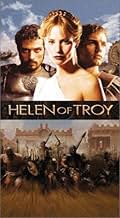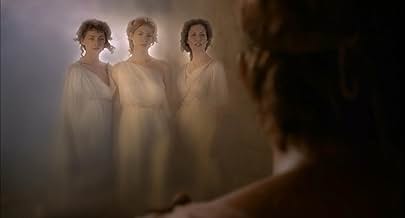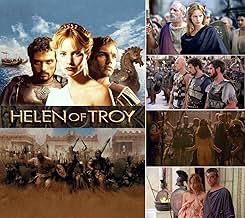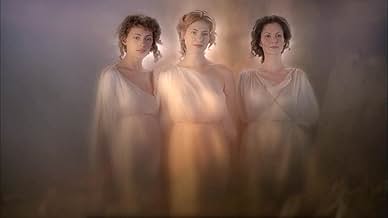NOTE IMDb
6,2/10
6,9 k
MA NOTE
L'enlèvement de la belle Hélène, épouse du roi spartiate Ménélas, par Paris de Troie déclenche une longue guerre.L'enlèvement de la belle Hélène, épouse du roi spartiate Ménélas, par Paris de Troie déclenche une longue guerre.L'enlèvement de la belle Hélène, épouse du roi spartiate Ménélas, par Paris de Troie déclenche une longue guerre.
- Nommé pour 1 Primetime Emmy
- 1 victoire et 7 nominations au total
Parcourir les épisodes
Avis à la une
There are many different stories and interpretations of Homer's Iliad, or better known as the 'Trojan War.' 'Helen of Troy' is one movie that showed a different perspective of the events in the leading lady's point of view.
The Iliad written by Homer, from which this film was based on, talks about the 'greatest war story ever told': the infamous 'Trojan War.' This legendary epic began with the elopement of Helen, the fairest woman in the land, and Troy's cursed Prince Paris. Menelaus, her husband, mad with jealousy and broken pride, allied with his brother, Agamemnon, to wage a war against Troy. They put together a great army consisting of the greatest and bravest warriors of their land, Greece. When they arrived at Troy, a dispute rose between Agamemnon and Achilles because of their women prizes, Chryseis and Briseis. This resulted to Achilles' refusal to participate in the war for nine years. During that time, victory for each country wavered as the gods and goddesses in Olympus helped their favorite side. When Achilles decides to fight at last, it is in revenge for his best companion, Patroclus who was killed by Hector. He slew Hector and dragged his body to his camp. Despite Zeus' disagreement, Hector died because he was fated to do so. Odysseus came up with the idea of the Wooden Horse. He planned to get inside the gates of Troy so they could finally attack. The Trojans brought in the horse and when night fell, the Greeks attacked the Trojans, burnt their houses, killed their children and took their women as prizes.
The characters portrayed in the movie were fashioned in such a way that they appeared to be real and complex human beings. They gave in to their desires and to their human weaknesses such as pride, jealousy and anger but they also fought for justice, honor and love. Therefore you can easily sympathize and understand their actions and decisions since we all have the same human flaws and experiences. Most of the characters in 'Helen of Troy' were very much true to the original text in the Iliad. However, some key roles were fabricated to make the audience sympathize and admire characters like Paris, Helen and Menelaus as opposed to their selfish and arrogant personalities in the Iliad. They acted very well and very convincing such that they become distinct from the other characters in the story. Each person was unique to the other.
The script of the movie was true to the text to some extent. The beginning of 'Helen of Troy' started with the judgment of Paris in Mount Ida, which first introduced the prince to Helen. He was banished from Troy to the mountain as an infant because of Cassandra's prophecy that he will cause the end of their country. He finds out that he is a prince of Troy when he defeats Hector in a game and is finally accepted into the family despite his sister's constant protests. During her sister's wedding, Helen was abducted by Theseus and was brought to his country. They stayed together for a few years and Helen started falling in love with him until Pollux came to save her and was killed in the process. Theseus also died and Helen was brought back to Sparta where her father, Tyndareus, gave her away to the soldiers. The soldiers couldn't deny her beauty but decided to choose the husband by tossing rings. The one closest to the jar was Menelaus' and therefore, they married. Once, Paris went to Sparta to make peace with the city but when he sees Helen, they fall in love. They elope and when Menelaus found out about this, he associated with his brother, Agamemnon. Upon Reaching Troy, Menelaus first decides to talk to Priam, the country's king. Priam refuses to give Helen back and that's where the war began.
Overall, the movie, 'Helen of Troy', has been loyal to the original text in the Iliad except in some aspects. They both portray roughly the same roles and personalities of the characters. Although love was not a plausible theme in Homer's text as shown in the movie and the gods' influencing the waves of war weren't concretely depicted in the film, other themes like pride and honor coincided in both. The changes in the script didn't ruin the outcome of the movie. They just served as a form of exaggeration to further establish the uniqueness of the characters. The Iliad is classic, and it should be remembered this way.
The Iliad written by Homer, from which this film was based on, talks about the 'greatest war story ever told': the infamous 'Trojan War.' This legendary epic began with the elopement of Helen, the fairest woman in the land, and Troy's cursed Prince Paris. Menelaus, her husband, mad with jealousy and broken pride, allied with his brother, Agamemnon, to wage a war against Troy. They put together a great army consisting of the greatest and bravest warriors of their land, Greece. When they arrived at Troy, a dispute rose between Agamemnon and Achilles because of their women prizes, Chryseis and Briseis. This resulted to Achilles' refusal to participate in the war for nine years. During that time, victory for each country wavered as the gods and goddesses in Olympus helped their favorite side. When Achilles decides to fight at last, it is in revenge for his best companion, Patroclus who was killed by Hector. He slew Hector and dragged his body to his camp. Despite Zeus' disagreement, Hector died because he was fated to do so. Odysseus came up with the idea of the Wooden Horse. He planned to get inside the gates of Troy so they could finally attack. The Trojans brought in the horse and when night fell, the Greeks attacked the Trojans, burnt their houses, killed their children and took their women as prizes.
The characters portrayed in the movie were fashioned in such a way that they appeared to be real and complex human beings. They gave in to their desires and to their human weaknesses such as pride, jealousy and anger but they also fought for justice, honor and love. Therefore you can easily sympathize and understand their actions and decisions since we all have the same human flaws and experiences. Most of the characters in 'Helen of Troy' were very much true to the original text in the Iliad. However, some key roles were fabricated to make the audience sympathize and admire characters like Paris, Helen and Menelaus as opposed to their selfish and arrogant personalities in the Iliad. They acted very well and very convincing such that they become distinct from the other characters in the story. Each person was unique to the other.
The script of the movie was true to the text to some extent. The beginning of 'Helen of Troy' started with the judgment of Paris in Mount Ida, which first introduced the prince to Helen. He was banished from Troy to the mountain as an infant because of Cassandra's prophecy that he will cause the end of their country. He finds out that he is a prince of Troy when he defeats Hector in a game and is finally accepted into the family despite his sister's constant protests. During her sister's wedding, Helen was abducted by Theseus and was brought to his country. They stayed together for a few years and Helen started falling in love with him until Pollux came to save her and was killed in the process. Theseus also died and Helen was brought back to Sparta where her father, Tyndareus, gave her away to the soldiers. The soldiers couldn't deny her beauty but decided to choose the husband by tossing rings. The one closest to the jar was Menelaus' and therefore, they married. Once, Paris went to Sparta to make peace with the city but when he sees Helen, they fall in love. They elope and when Menelaus found out about this, he associated with his brother, Agamemnon. Upon Reaching Troy, Menelaus first decides to talk to Priam, the country's king. Priam refuses to give Helen back and that's where the war began.
Overall, the movie, 'Helen of Troy', has been loyal to the original text in the Iliad except in some aspects. They both portray roughly the same roles and personalities of the characters. Although love was not a plausible theme in Homer's text as shown in the movie and the gods' influencing the waves of war weren't concretely depicted in the film, other themes like pride and honor coincided in both. The changes in the script didn't ruin the outcome of the movie. They just served as a form of exaggeration to further establish the uniqueness of the characters. The Iliad is classic, and it should be remembered this way.
I disagree with the reviewer who thinks Paris is prettier than Helen. Sienna Guillory is gorgeous! As in the Iliad Paris & Helen are a matched pair. I also disagree with the reviewer who panned the movie because it was not faithful to the Iliad. No movie, not even a TV miniseries, can be expected to be totally faithful to any book. A movie is always a selection. The question should not be what was omitted, or whether it compressed or altered the text for cinematic purposes. Of course it did! The question is whether or not it captured the spirit of the original, or whether it did violence to that spirit, as too many movies do. In my view this movie captured the spirit of the Iliad surprisingly well. Perhaps the Greek heroes, especially Agamemnon, do not come off as heroically as the modern viewer has come to expect. But then our idea of heroism, (confused as it too often is with idealism), is not Homer's; and, then again, this movies portrayal of the Greeks as devious aggressors plotting the conquest of Troy is both historically accurate and does nothing to distort Homer's portrait of them. He certainly would have agreed. I did feel that the movie became somewhat rushed at the end. Unfortunately, this seems to be a common problem with many movies based on classic works of literature. The director seems to lavish most of his energy and resources on the beginning and middle of the story. Then, as time and money begin to run out, the ending becomes hurried, episodes are combined, the story becomes perilously compressed. But even here, the movie does not really leave the viewer disappointed. The scene in which the Trojan Horse suddenly appears without explanation outside the walls of Troy is particularly effective, because it appears to the viewer just as it must have appeared to the Trojans. Even though one may wish for more, nothing in the movie's ending distorts Homer's tale of the fall of Ilium.
DVD borrowed from my local public library, DTS sound, widescreen, each half on each of two disks, I watched it on consecutive nights. I was most drawn to it for Sienna Guillory, young British actress and daughter of a famous musician from Cuba, whom I had seen in the modern remake of 'The Time Machine.' She plays Helen of Sparta, who becomes Helen of Troy, and is the default object of passion which sparks the war and eventual fall of Troy, via the Trojan Horse. Agamemnon and Achilles are depicted as heartless killers with no redeeming qualities. I don't know what Homer had in mind, but this seems to be decidedly different from most earlier treatments of these mythical characters. The video transfer to DVD is very high quality, but the sharpness and realistic colors are not as effective as some period pieces (e.g. Gladiator) which use a mildly tinted image and selective focus to better depict the olden times. Still, for the type of movie it is, a worthwhile depiction of some important Greek mythology.
As a big fan of mythology and the Iliad, I'm pretty surprised by how nitpicky people are being on the details. Having taken a "Mythology in Film" course, I can safely state the following:
1) It's not supposed to be "The Iliad," it's "Helen of Troy." 2) It's a film. Made 3,000 years later. Targeted at an entirely different audience. 3) Greek mythology tends to be greatly inconsistent anyway, depending on your source. 4) Patroklus is never mentioned to justify Achilles's rage against Hector. So what? If Achilles hadn't withdrawn from war, he would've killed Hector anyways. And having him withdrawing and re-entering into the war would only have distracted from the main story (Helen) without really adding anything.
There's a difference between myths and literature. One can stray from the literature of a story while staying true to the mythology of it. The Iliad itself was constantly being reinvented by generations of oral poets who changed the story every time they performed it. Back in ancient times, a person who merely recited the story verbatim would be considered an inferior, because he'd merely be a copycat rather than a storyteller.
When it comes to the spirit and tradition, "Helen" shines. For instance, in the Iliad, Achilles compares Agamemnon taking Brisius to Paris taking Helen. In the film, the comparison is made literal. Brilliant. Then you have themes and scenes taken from the Orestia. Three or four different ideas are brought together in the span of one.
"Helen" may be a bit loose with the details, but it shows a good understanding why those details took place, and stays true to capturing their motivations. Just because they don't follow the material exactly doesn't mean they don't know it really, really well. The same is true for a lot of other film productions, from "Desire Under the Elms" to "O Brother Where Art Thou" to "Medea" and even "Clash of the Titans."
All and all, a good flick, I was pleasantly surprised. My only real complaints was the casting of Achilles (I assume they were combining his character with Ajax/Diomedes) and the fact that Hector never gets to actually beat anyone in combat (That was disappointing, to say the least).
1) It's not supposed to be "The Iliad," it's "Helen of Troy." 2) It's a film. Made 3,000 years later. Targeted at an entirely different audience. 3) Greek mythology tends to be greatly inconsistent anyway, depending on your source. 4) Patroklus is never mentioned to justify Achilles's rage against Hector. So what? If Achilles hadn't withdrawn from war, he would've killed Hector anyways. And having him withdrawing and re-entering into the war would only have distracted from the main story (Helen) without really adding anything.
There's a difference between myths and literature. One can stray from the literature of a story while staying true to the mythology of it. The Iliad itself was constantly being reinvented by generations of oral poets who changed the story every time they performed it. Back in ancient times, a person who merely recited the story verbatim would be considered an inferior, because he'd merely be a copycat rather than a storyteller.
When it comes to the spirit and tradition, "Helen" shines. For instance, in the Iliad, Achilles compares Agamemnon taking Brisius to Paris taking Helen. In the film, the comparison is made literal. Brilliant. Then you have themes and scenes taken from the Orestia. Three or four different ideas are brought together in the span of one.
"Helen" may be a bit loose with the details, but it shows a good understanding why those details took place, and stays true to capturing their motivations. Just because they don't follow the material exactly doesn't mean they don't know it really, really well. The same is true for a lot of other film productions, from "Desire Under the Elms" to "O Brother Where Art Thou" to "Medea" and even "Clash of the Titans."
All and all, a good flick, I was pleasantly surprised. My only real complaints was the casting of Achilles (I assume they were combining his character with Ajax/Diomedes) and the fact that Hector never gets to actually beat anyone in combat (That was disappointing, to say the least).
Unlike the epic TROY, which spent much time and money recreating the spectacle of the Trojan War with CGI, the emphasis here is on the political ambitions and prophecies leading up to the start of the siege of Troy. Rufus Sewell as Agamemnon gives a performance (as the man who would conquer Troy) which eerily evokes Oliver Reed at his sinister best, as he makes it clear that the romance of Helen and Paris was merely a convenient excuse for the events that followed, and that the war came out of his own thirst for conquest. Sienna Guillory is attractive as Helen, but her role is rapidly reduced to that of a bystander in the great events that swirled around her. And the film makes clear its logic about this: how could a woman be responsible for a war in a time when even princesses were chattels of the royal houses to be auctioned off in marriage for political gain? As it deals more intimately with its characters and looks more closely at social power structures and gender roles of the period, this film is much more interesting as a human drama than the rather empty spectacle TROY.
Le saviez-vous
- AnecdotesThis adaptation changes several aspects of the original legend of Helen. The gods play almost no role in the characters' lives, Helen is not shown to have any children and it's not explained how Cassandra supposedly got her powers. Instead, the series plays the story like a brutal historical event with little supernatural elements.
- GaffesIt is mentioned three times that Troy is the gateway to the riches of Byzantium. The city of Byzantium was founded in 667BC five centuries after the Trojan War.
- ConnexionsReferenced in In Praise of Action (2018)
Meilleurs choix
Connectez-vous pour évaluer et suivre la liste de favoris afin de recevoir des recommandations personnalisées
- How many seasons does Helen of Troy have?Alimenté par Alexa
Détails
- Durée1 heure 28 minutes
- Couleur
- Mixage
- Rapport de forme
- 1.78 : 1
Contribuer à cette page
Suggérer une modification ou ajouter du contenu manquant
























